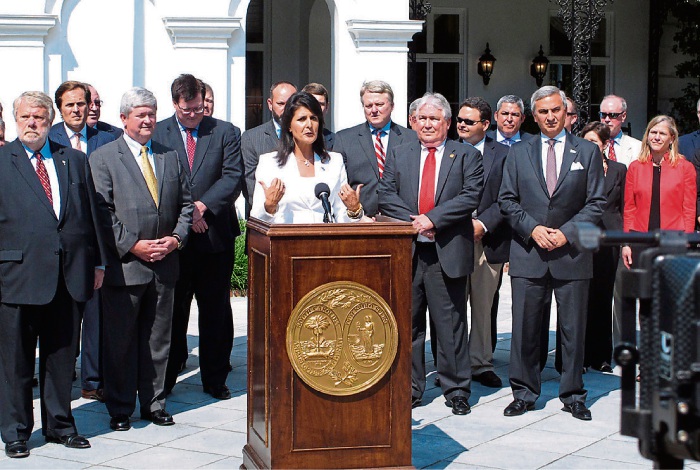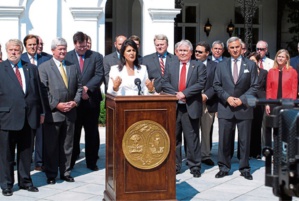Volvo Cars made it official early today: The organization picked South Carolina as the area for its first North American industrial facility, with arrangements to put up to $500 million in an office with an ability to deliver up to 100,000 automobiles a year.
The Volvo arrangement is only the most recent in a rush of new auto processing plants inherent in North America, particularly Mexico. Also, it’s another help to a South Carolina fabricating economy that has been going gangbusters recently.
In any case, the Volvo declaration makes a big appearance as a head-scratcher to a few players in the auto business and to some economic-development specialists why should attempting comprehend the essential suppositions and hidden vital objectives of Volvo and its parent, China-based Zhejiang Geely Holdings. Volvo administrators didn't instantly give a great deal of insights about their system, thought processes and arrangements.
The South Carolina plant will be one of a system of Volvo plants will utilize the organization's exclusive Scalable Product Architecture (SPA) stage, a particular methodology — like a framework Volkswagen Group has called MQB — that permits the configuration and generation of a wide mixed bag of vehicles on a sole mechanical stage. The new Volvo XC-90 due to be out this year, and additionally 14 distinct vehicles throughout the following three years, all will be based on SPA, a representative said.
Unmistakably the plant's closeness to the Port of Charleston — only 30 miles away — is critical to making the money. At the plant, Volvo said that it will make the “latest generation of Volvo models for sale in the United States and for export.” Volvo CEO Hakan Samuelsson said that “logistics was one of the most important factors” for the plant, as indicated by Reuters.
Another bit of educated hypothesis on the organization's intentions proposed that the plant declaration partially is gone for blunting potential feedback of the way that, one month from now, Volvo will start trading the Chinese-made S60L to the United States. Veteran industry observer John McElroy, of the Autoline site, noticed that this will be “the first Chinese-made car sold in the American market and in some circles that will generate a big backlash against Volvo.”
Truth be told, the last significant auto get together declaration for the United States came seven years before, when Volkswagen guaranteed to fabricate the plant in Chattanooga, Tenn., that it opened in 2011. Of the nine North American gathering operations declared via auto organizations since 2009, eight of them have been slated for Mexico. The main exemption in the vehicle business has been Daimler 's declaration in March that it will burn through $500 million to construct another get together plant close to Charleston that will make substantial business vans and result in the production of more than 1,300 employments.
The measure of a tax on delivery a Volvo out of South Carolina to an European Union country would be around 10 percent, or $3,000 on an average $30,000 Volvo, one industry examiner evaluated – or about equivalent to the whole cost of gathering that vehicle.
References:
http://www.forbes.com/sites/dalebuss/2015/05/11/volvo-to-build-in-south-carolina-but-plan-is-a-head-scratcher/
http://www.forbes.com/sites/dalebuss/2015/05/11/volvo-to-build-in-south-carolina-but-plan-is-a-head-scratcher/2/
The Volvo arrangement is only the most recent in a rush of new auto processing plants inherent in North America, particularly Mexico. Also, it’s another help to a South Carolina fabricating economy that has been going gangbusters recently.
In any case, the Volvo declaration makes a big appearance as a head-scratcher to a few players in the auto business and to some economic-development specialists why should attempting comprehend the essential suppositions and hidden vital objectives of Volvo and its parent, China-based Zhejiang Geely Holdings. Volvo administrators didn't instantly give a great deal of insights about their system, thought processes and arrangements.
The South Carolina plant will be one of a system of Volvo plants will utilize the organization's exclusive Scalable Product Architecture (SPA) stage, a particular methodology — like a framework Volkswagen Group has called MQB — that permits the configuration and generation of a wide mixed bag of vehicles on a sole mechanical stage. The new Volvo XC-90 due to be out this year, and additionally 14 distinct vehicles throughout the following three years, all will be based on SPA, a representative said.
Unmistakably the plant's closeness to the Port of Charleston — only 30 miles away — is critical to making the money. At the plant, Volvo said that it will make the “latest generation of Volvo models for sale in the United States and for export.” Volvo CEO Hakan Samuelsson said that “logistics was one of the most important factors” for the plant, as indicated by Reuters.
Another bit of educated hypothesis on the organization's intentions proposed that the plant declaration partially is gone for blunting potential feedback of the way that, one month from now, Volvo will start trading the Chinese-made S60L to the United States. Veteran industry observer John McElroy, of the Autoline site, noticed that this will be “the first Chinese-made car sold in the American market and in some circles that will generate a big backlash against Volvo.”
Truth be told, the last significant auto get together declaration for the United States came seven years before, when Volkswagen guaranteed to fabricate the plant in Chattanooga, Tenn., that it opened in 2011. Of the nine North American gathering operations declared via auto organizations since 2009, eight of them have been slated for Mexico. The main exemption in the vehicle business has been Daimler 's declaration in March that it will burn through $500 million to construct another get together plant close to Charleston that will make substantial business vans and result in the production of more than 1,300 employments.
The measure of a tax on delivery a Volvo out of South Carolina to an European Union country would be around 10 percent, or $3,000 on an average $30,000 Volvo, one industry examiner evaluated – or about equivalent to the whole cost of gathering that vehicle.
References:
http://www.forbes.com/sites/dalebuss/2015/05/11/volvo-to-build-in-south-carolina-but-plan-is-a-head-scratcher/
http://www.forbes.com/sites/dalebuss/2015/05/11/volvo-to-build-in-south-carolina-but-plan-is-a-head-scratcher/2/






